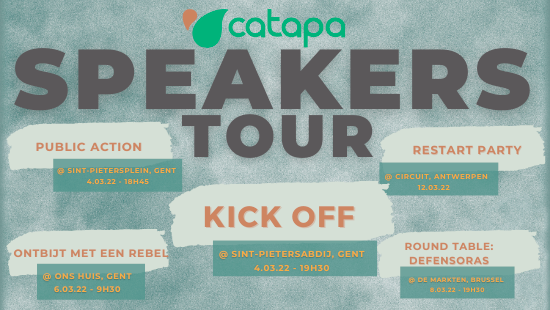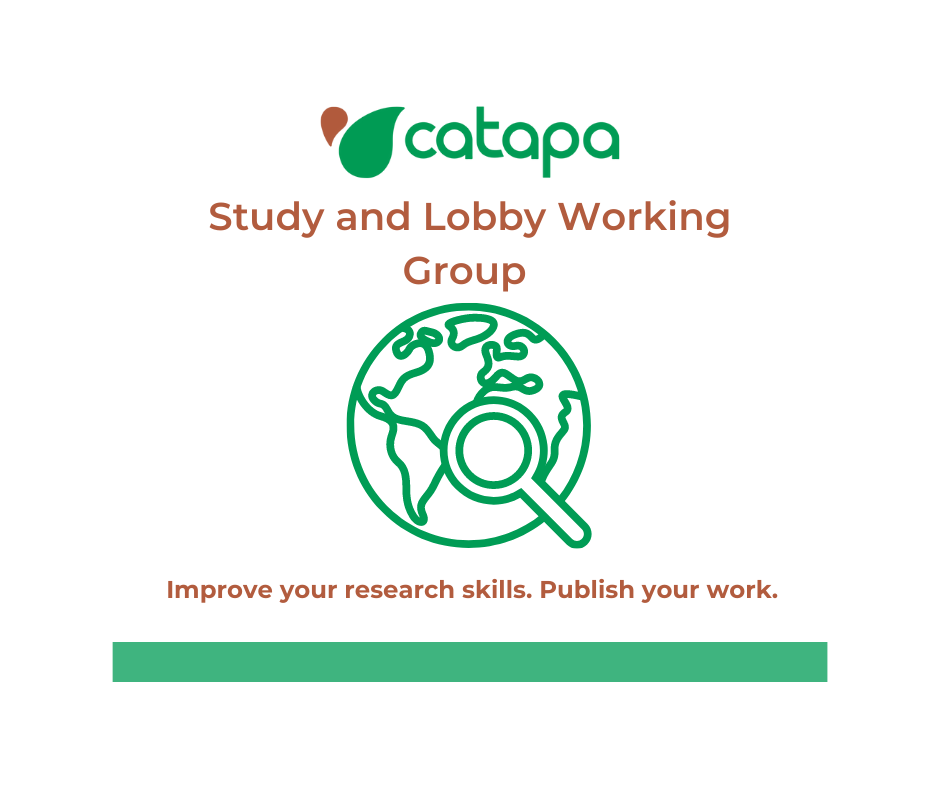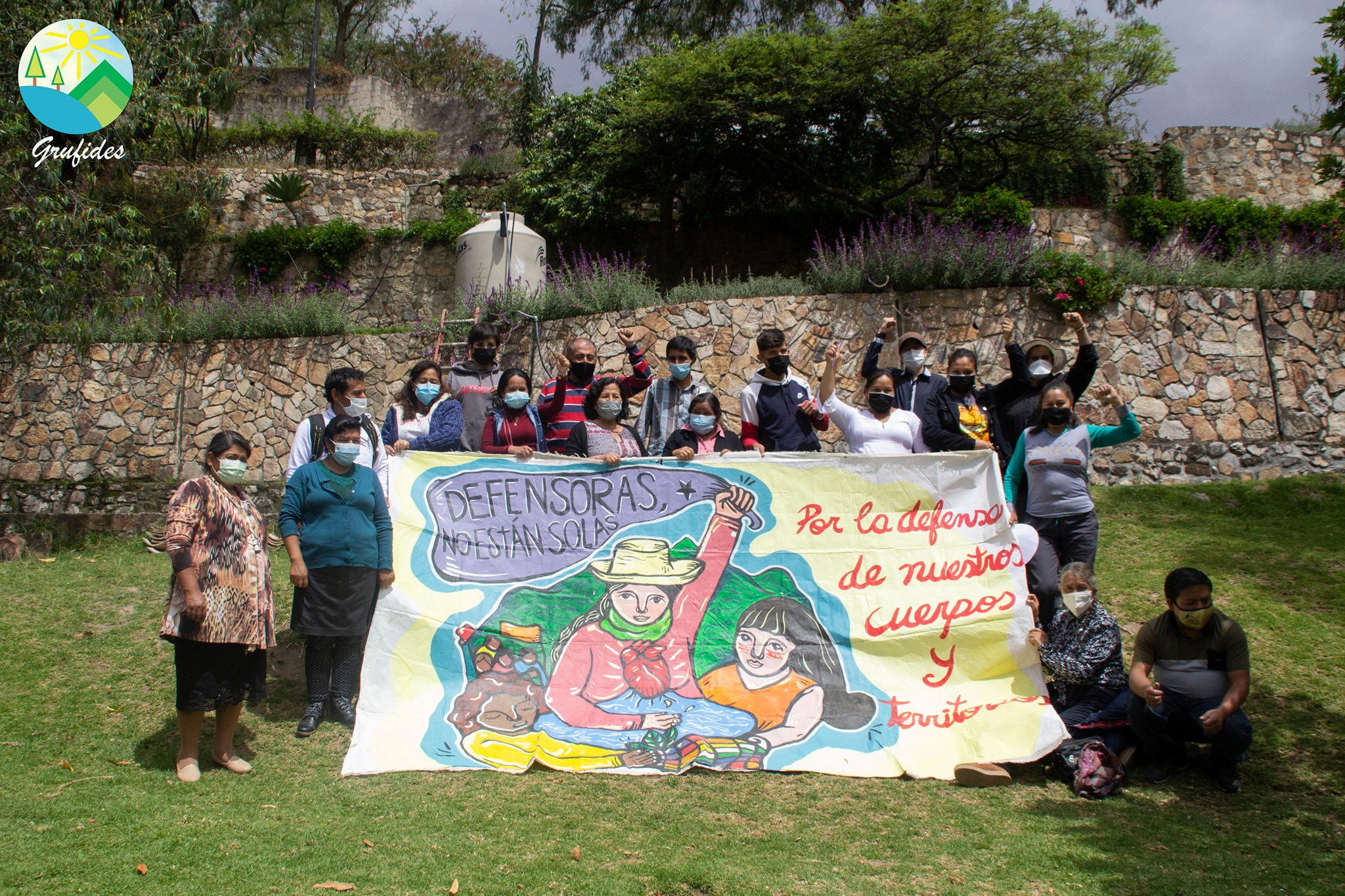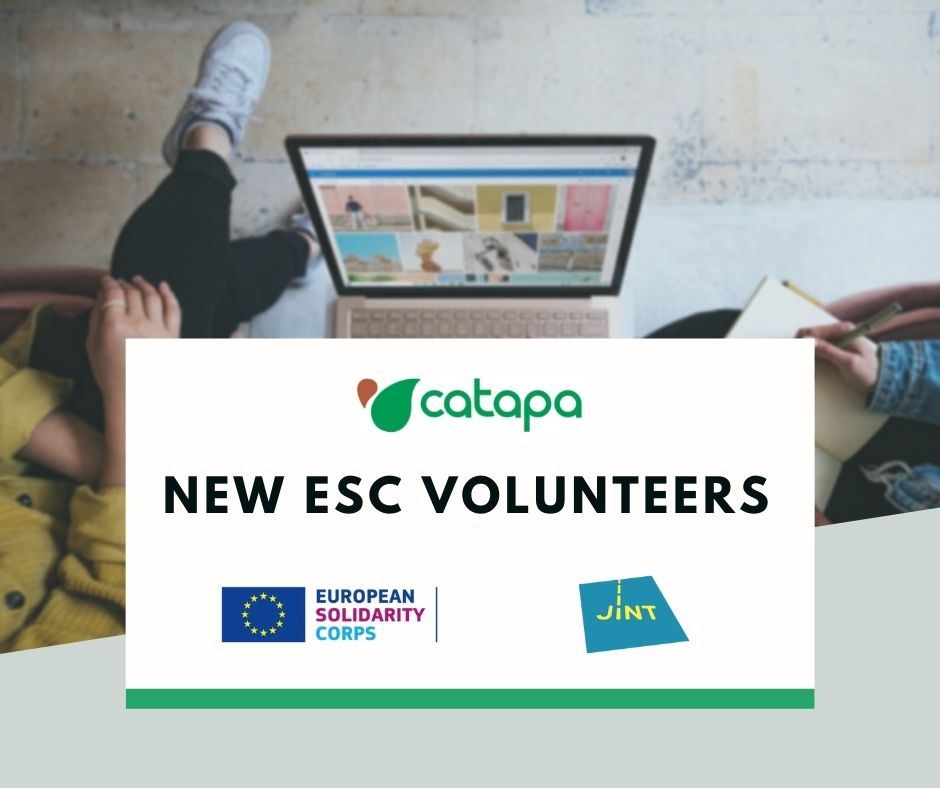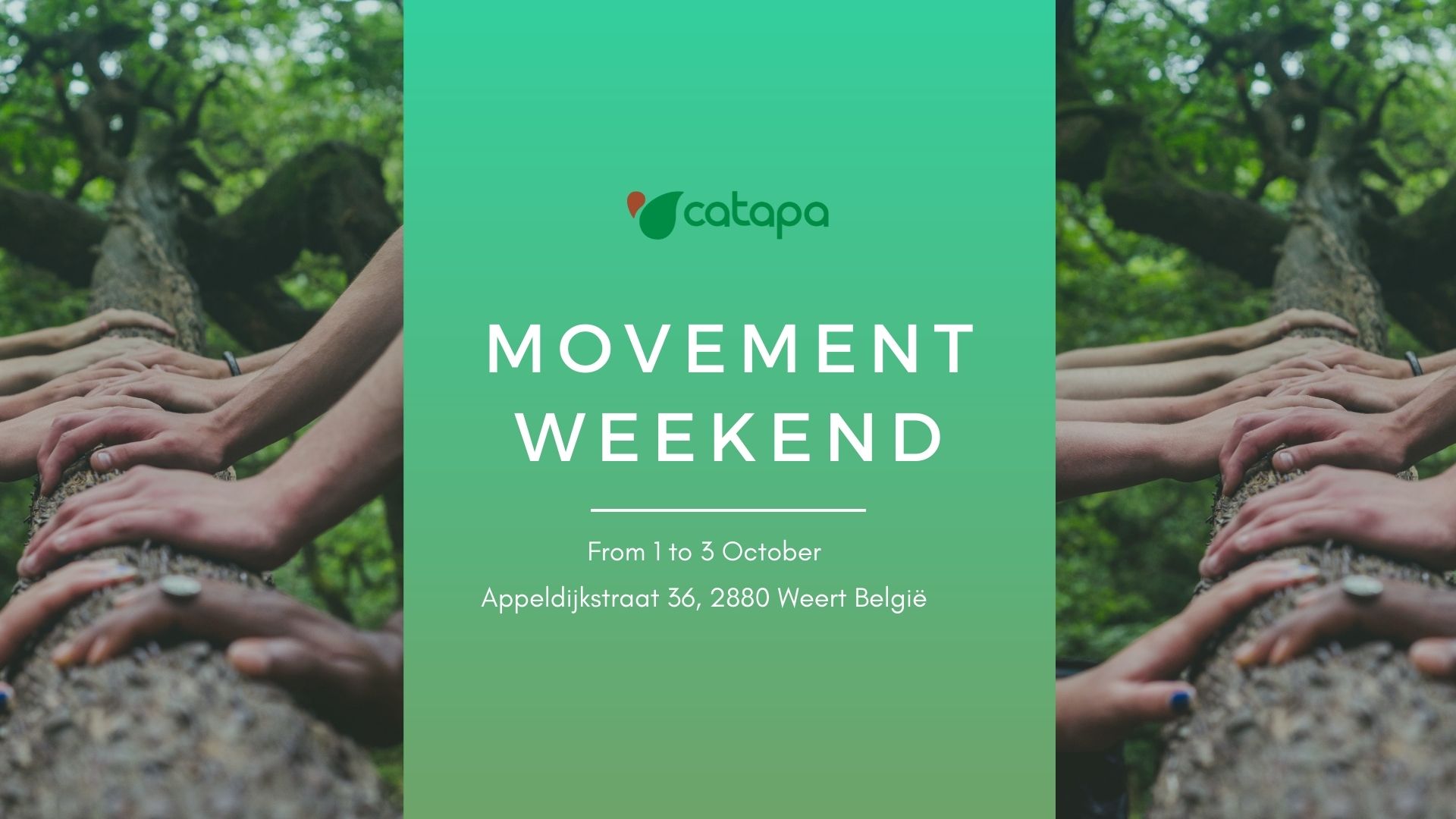Speakers Tour 2022 Overview
SPEAKERS TOUR 2022 OVERVIEW
The Speakers Tour was a big success! Thank you all so much for making this happen! What a wonderful edition. This year, two environmental defenders, Mirtha and Rosas from Cajamarca, Perú, were invited by Catapa to raise awareness and to talk about their struggle.
They shared their story fighting big scale mining in Perú and talked about how standing up for their rights comes with the risk and fear of being intimidated, stigmatized and prosecuted. During their visit they talked to students, local and european politicians, press, civil society organisations and interested citizens.
Let’s recap everything we did:

Finally the day has arrived: our guests will arrive in Belgium. In times of Covid, this is not an easy task. When Rosas, Mirtha and Maxime are supposed to board their first plane in Cajamarca, Perú, to Lima, Mirtha and Maxime are refused entry. Rosas is able to pass and does the transcontinental journey all by himself. Luckily, we manage to find flights to get Maxime and Mirtha on a plane the next day. At night we go to pick up Rosas at Brussels Airport. But, he does not come through arrivals at the expected time! Then we find out his flight from Lima has been delayed and he missed his connection flight. Four hours later than planned, he finally arrives! What an adventure, welcome to Belgium Rosas, so curious to hear all your stories and the wisdom you will share with us.
Arrival Mirtha & Maxime: Good news, we heard Mirtha and Maxime were able to start their journey this time and will arrive in the evening. With Rosas we already start preparations for the presentations he will give during his time here. It seems he brought the sun, because since he arrived we have only had clear blue skies and sunshine. He has so much to tell us and many questions to ask too. At night at last Mirtha and Maxime are picked up at Ghent station. We celebrate by eating a mountain of Belgian fries. Our speakers are finally reunited, the tour can start!

EEB Event
Our Peruvian environmental defenders, alongside indigenous representatives from Russia and Guatemala, meet with MEP’s to share their stories of fighting on the frontlines to defend their communities from destructive mining projects.
They demand tougher battery and due diligence legislation that centres the voices and experiences of impacted communities. Under the ‘social licence to operate’ (SLO), a non-binding voluntary commitment to ‘good practice’, corporations are able to greenwash their operations. International voluntary standards on responsible corporate conduct have failed to have an impact on environmental and human rights abuses along supply chains.
The delegation emphasised the importance of retaining copper, bauxite and iron within proposed due diligence obligations. They also brought attention to the need to include obligations towards climate impacts.
You can read the full article here

Public action
El pueblo reclama el agua que es vida, porque la minera ensucia y contamina…”
When one thinks of Cajamarca, one thinks of Carnival. As the Carnival capital of Peru, it isn´t a surprise we can also recognize this Carnival culture in the activists´ fight against mining companies. There are dozens of carnival songs written about the defense of water and human rights. Art is one of the most powerful forms of protests, and has been during hundreds and hundreds of years. Murals, songs, tales, poetry, paintings, all forms of art can be powerful ways of protesting. Think of the impact Máxima Acuña had when she sang her story when she won the Goldman Environmental Prize instead of telling it…
And it´s that bit of Cajamarcan culture, and art as a powerful way of protest, that we brought to Sint-Pietersplein in Ghent on the first Friday of our Speakers Tour. We sang typical carnival resistance songs from Cajamarca about the defense of their rivers, lakes and land as an opening of our tour and out of solidarity with Cajamarca. ¡Agua si, oro no!
KICK-OFF
After our public action our Speakers Tour could really start! In a nice setting in the Sint-Pietersabdij, we all got together to really get to know our guests for the first time. After some nice introductions by Truike, part of the organization of the Speakers Tour, Charlotte, as partner coordinator, and Maxime as GECO in Cajamarca, we finally got the chance to hear the stories of Mirtha and Rosas first hand!
Mirtha, director of our partner GRUFIDES, told us about the beauty of Cajamarca, a district in the northern Andes of Peru, and how it suffers under mining activities. 23.9 per cent, almost a quarter of Cajamarca, is already sold to mining companies! Mirtha told us about the impacts of these mining activities in her region, in a very emotional speech, and showed all of us why we should keep fighting against mining projects.
Then it was Rosas turn. Rosas comes from the Valley of Condebamba in Cajamarca. He told us about how he dedicated his life fighting against formal, informal and ilegal mining projects in his region, how he spent months up in the mountains amongst thousands of his compañeros and made the mining company leave, about how he has already been denounced 5 times for defending his land. He told us about how the products from his Valley are completely contaminated by heavy metals, and how these products are exported and sold even in Carrefour in Belgium! This shows us once again that the fight against mining activity isn´t something from far away, it´s something that impacts all of us, we are also eating these contaminated avocados. ¡La lucha es de todxs!

Breakfast with a Rebel
The first public event of the tour! A traditional one: our annual Breakfast with a Rebel/Ontbijt met een Rebel, part of the Gentian Belmundo Festival! Together with partners FOS, GAPP, Linx+ & Cubanismo we placed 6 rebels around seperate tables. The rebels all had an interesting personal story with a link to human and nature rights. Participants could enjoy a Palestinian brunch, while listening to these inspiring stories. Two of those rebels were Rosas & Mirtha! Their enriching stories showed the strong interlinkedness between human and nature rights, from a Peruvian perspective.
Tourist trip in Ghent
The guides Alberto and Silke were showing Mirtha and Rosas around in Ghent. Both were very interested in how the city is changing into a more friendly for pedestrians and bikers. And how the water system in Ghent was reconstructed towards recreative and sustainable goals. We had a hot chocolate and some Belgian waffles to warm up!

Bel-LATAM Network
Mirtha participated in her first Bel-LatAM Network meeting at the office of 11.11.11. She was surprised by the many people knowing Grufides and having worked before with Mirtha Vasquez. Mirtha was very eager to share the movie where Maxima Acuña is filmed in Cajamarca in Dec too, making the connections with screening here in Brussels. Mirtha ended the meeting with sharing many stories and anecdotes about the analphabetic populations affected by mining and being very vulnerable in how to protect themselves having no access to the Spanish Language, documents or data. And how mining is framed as needed for the so-called “green transition” but really affected again their territory. Our international support is more than ever needed.
Student Event Leuven
Rosas travelled to KU Leuven to deliver a striking testimony about the impact of several mining projects on his community and their collective resistance. In the second half of the event, students were challenged to question the links between extractivism and their university.
You can read the full article here
Strategic meeting Perú WG
The members of the Peru WG met all together for the first time in person!!! We had the chance to listen directly from Rosas the current situation in the valle de Condebamba where the communities are threatened by informal mining and we listened to Mirtha updating us about the new threats of the subterranean mining that Yanacocha wants to start. We then brainstorm about further activities that the WG can put in placed to support the fight of our friends.

Round Table
On March 8, on the occasion of International Women’s Day, we listened to the testimony of defensoras from Peru, Colombia and The Netherlands/Bolivia. They shared stories about climate activism and their experiences and struggles within the defense of their territories, in order to promote solidarity and to connect different struggles for justice. They also talked about the vital role of women in activism.
Student event in Antwerp
Rosas gives a powerful testimony to students of the University of Antwerp. After a Q&A, the students take part in a citizen council, in which they take a critical view on the link between mining and their university. Willy guides Rosas through Antwerp, and they have dinner in the restaurant Via Via.

Meeting with Quinoa
Mirtha met with Quinoa, one of Grufides partners, to present the ongoing projects of Grufides, update about the current situation in Cajamarca and discuss the programme of the Quinoa summer project for a group of Belgian volunteers
Farm visit
Rosas met with farmers from Boerenforum, a collective of farmers organisations utilising a range of agroecological methods within Flanders, to exchange knowledge and practices. Agroecology is a not only a practical science involving zero use of chemicals and pesticides, but also a social movement. Agroecology calls for the complete dismantlement of the industrial food system and green revolution, with it’s focus on food production and profits over access and the rights of nature.
The delegation visited several farms across the region, including a bio-dairy farm which creates a variety of agroecological products, including it’s own delicious ice cream! The delegation shared their experiences of working within a variety of farm systems and environments. They also discussed several barriers preventing the further scaling up of agroecology within both the European Union and Peru, including access to technical knowledge and expertise, financial support, land, water and harmful legislation that continues to prioritise destructive industrial agriculture over the environment.

H-LEP and NEMO
Mirtha and Rosas participated in a High-Level Expert panel (H-LEP) on recycling mining waste organised by EU Horizon 2020 NEMO project. People from academia, industry, civil society, the European Commission and the United Nations sat together with our Peruvian guests at the table looking for a global perspective on the revalorisation of mining tailings. Mirtha was invited as a speaker and presented the mining waste reality and the community’s struggles in Cajamarca. She ended her presentation with four recommendations for the European Commission: protect Human Rights, provide meaningful community participation, empower the community to recognise and revindicate indigenous knowledge. After Mirtha’s presentation, the other three speakers presented a proposal of recycling mining waste in Bolivia, the Recycling of mining waste in Sweden, and the Life Cycle Assessment to evaluate the impact of recycling mining waste.
Following the presentations, Mirtha and Rosas participated in round tables to bring their perspectives and experiences further. Meeting them was, for many, a reality check of the situation at the beginning of our metal supply chain.
Yes to Life No to Mining network
Mirtha met like-minded civil society activists from the Yes to Life No to Mining network (YLNM) in the afternoon and evening. It was an international hybrid meeting, with people joining from Brussels, the UK, Finland, Spain, Belgium, Ireland, Bolivia, Peru, and many more European and non-European countries. The objective of the meeting was to align understandings and strategies on the Right to Say No (RTSN). Mirtha painfully described the absence of the RTSN in Cajamarca and Perú in general and vividly described the consequences of this gap. Our understanding of the RTSN is growing fast, just as the demand for more metal for the green transition to fighting Climate Change. We still need to learn many things, but we know for sure that communities like Cajamarca, and people like Mirtha and Rosas, need to be in the driving seat when it comes to deciding on mining their resources and quality of life. They need to have the Right to Say No.

Lunch with the city of Ghent
We had a lunch meeting today with people of the city of Ghent, including a deputy minister of international cooperation!
Pago a la tierra
On our last Saturday morning, a sunny morning anouncing spring is finally on its way, we took a bus and a tiny little ferry to visit the natural reserve of Levende Leie and end our Speakers Tour with an intimate ceremony, a pago a la tierra. In Peruvian culture during these pagos a la tierra you thank the Earth for all its given you and ask to continue helping you in the future. We circeled around some typical peruvian foods, seeds from Cajamarca, flowers, natural products, and Cajamarcan instruments, and expressed our gratitude for these last two weeks, for all we´ve learned and shared, and vouched that we will always continue this fight together.
Trip to Brugge
Rosas and Mirtha visited Bruges and were fascinated by the charm of this small town in Flanders: the historic centre, the cobbled streets… We had a nice lunch and shared a waffle afterwards! It was a very nice day in which we shared anecdotes from the tour.
Restart Party
CATAPA, together with Bos+, Repair&Share, De Transformisten and Avansa, gave a preview of what a system without growth would look like, at the Restart Party in Antwerp.
While repairers at the Repair Café tried to get electro-appliances working again, our workshop went deeper into the dangers of planned obsolescence for people and the environment. We dwelt on the actions needed to wake up politicians and businesses to push that reset button. Rosas and Mirtha shared their story and afterwards we went to @Circuit’s cozy Kringwinkel.
End of the Tour
The tour is finally over. Thank you all so much for making this happen! What a wonderful edition. Thanks to all of you who all helped in many different ways. What a privilege to have had them here for this time and what a joy to have it shared with so many.
THANK YOU ALL WONDERFUL CATAPISTAS!!!! For the amazing organization! And the super leuke activities and initiatives!!!





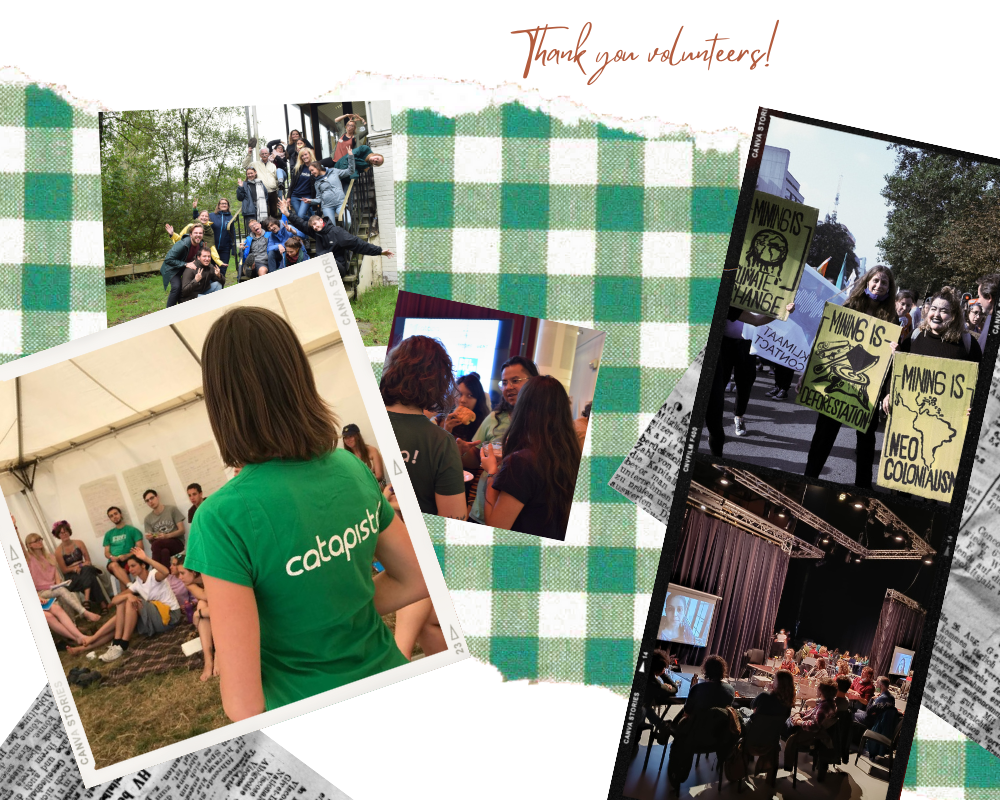

 Do you have nice #catapistas pictures yourself? Send them to communication.sc@vzw.catapa.be! Or share them via social media with
Do you have nice #catapistas pictures yourself? Send them to communication.sc@vzw.catapa.be! Or share them via social media with 